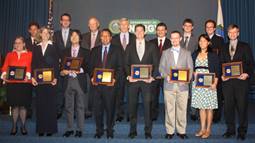Applauding Excellence and Achievement
Science is often about new beginnings: New ideas, discoveries, innovations.
Those new beginnings often spring from new scientists, up and coming individuals who have taken up the challenge of the scientific endeavor. That's why the Department of Energy (DOE) is celebrating DOE-supported researchers recently honored with the prestigious Presidential Early Career Award for Scientists and Engineers (PECASE).
PECASE awards are bestowed on early-career scientists and engineers who show exceptional promise and make outstanding contributions to their respective fields. Thirteen DOE-supported researchers were among the 96 PECASE winners named by the White House this year. The awardees, nominated by the individual federal agencies that support their research, were honored at a White House ceremony on July 31. DOE held a special ceremony for the DOE-supported winners the following day.
Several PECASE winners were supported and nominated by DOE's Office of Science. For instance, Dr. Peter Mueller, a Nuclear Physicist from Argonne National Laboratory, was honored for developing techniques to 'trap' atoms and applying the new methods to better understand the fundamental forces of nature.
Dr. Heileen Hsu-Kim of Duke University was cited for her work on the transport of toxins underground and her success in predicting mercury methylation—a reaction that results in the most toxic form of mercury—in sediments.
Dr. Christopher Hirata of the California Institute of Technology was honored for innovative work in astrophysics and cosmology, enabling significant reduction of uncertainties in inferring physics from cosmological observations, and for his service on the NASA/DOE Joint Dark Energy mission working groups.
Dr. Pablo Jarillo-Herrero of Massachusetts Institution of Technology (MIT) was cited for his research on graphene as well as a class of materials called topological insulators, which allow electrons to move on their surfaces but not through their insides—materials relevant to future energy applications.
Dr. Daniel Sinars of Sandia National Laboratories (Sandia Labs) was honored for his work on high-energy-density plasmas, using both experiment and computer simulation to better understand these special states of matter.
Dr. Jesse Thaler of MIT was honored for his work exploring physics beyond the Standard Model and for developing improved techniques of distinguishing events at the Large Hadron Collider at the European Center for Nuclear Research (CERN).
Researchers supported and nominated by several other DOE organizations were also among the awardees. Dr. Jeffrey Banks and Dr. Heather Whitley of Lawrence Livermore National Laboratory and Dr. Amy Clarke of Los Alamos National Laboratory were nominated by the National Nuclear Security Administration. Dr. Stanley Atcitty of Sandia Labs was nominated by the Office of Electricity Delivery and Energy Reliability, and Dr. Thomas Jaramillo of Stanford by the Office of Energy Efficiency and Renewable Energy. Dr. John Kitchin was nominated by the Office of Fossil Energy, and Mr. Derek Gaston of Idaho National Laboratory was nominated by the Office of Nuclear Energy.
DOE's Office of Science is the single largest supporter of basic research in the physical sciences in the United States and is working to address some of the most pressing challenges of our time. For more information about the PECASE Awards, please go to http://science.energy.gov/about/honors-and-awards/pecase/.


 DOE Office of Science
DOE Office of Science